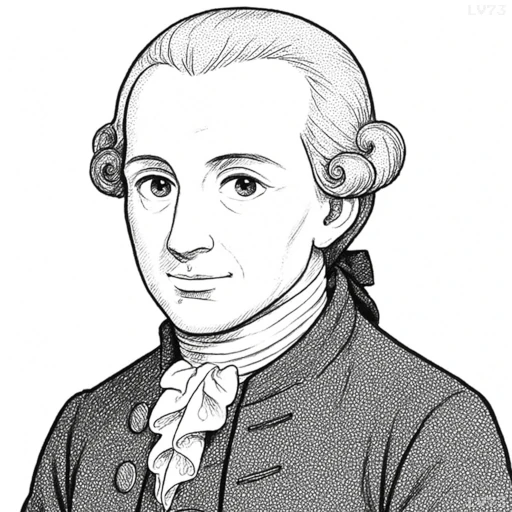“All thought must, directly or indirectly, by way of certain characters, relate ultimately to intuitions, and therefore, with us, to sensibility, because in no other way can an object be given to us.”

- April 22, 1724 – February 12, 1804
- Born in Germany (East Prussia)
- Philosopher
table of contents
Quote
“All thought must, directly or indirectly, by way of certain characters, relate ultimately to intuitions, and therefore, with us, to sensibility, because in no other way can an object be given to us.”
Explanation
In this quote, Immanuel Kant is emphasizing that all thought—whether abstract or concrete—must ultimately be connected to sensory experience. For Kant, intuition refers to the raw data that we perceive through our senses, such as sights, sounds, or touch. He argues that thought (or concepts) cannot exist independently of sensory input because knowledge begins with the experience of the world around us. Sensibility is the capacity to receive and process these sensory impressions, and without it, we cannot have any object of thought. Thus, for Kant, both thought and sensibility are integral to understanding the world, as concepts are applied to intuitions in order to form knowledge.
This idea holds great relevance in modern epistemology and cognitive science, where theories of perception and conceptualization focus on the interaction between sensory data and mental structures. In fields like psychology, this view helps explain how humans perceive and categorize the world: raw sensory data is processed by the mind, which uses concepts to make sense of the experiences. For example, we don’t just see colors or shapes; our minds organize these sensory inputs into meaningful objects or ideas based on prior knowledge and reasoning. Kant’s philosophy continues to inform contemporary debates about the nature of consciousness and perception, especially in understanding how the mind constructs reality from sensory information.
Historically, Kant’s assertion challenges both empiricist and rationalist perspectives. While empiricists like Hume argued that all knowledge comes from sensory experience, and rationalists like Descartes emphasized the role of reason in shaping knowledge, Kant sought to synthesize these views. His argument that both intuition and concepts are necessary for knowledge creation reflected his transcendental idealism, where he claimed that knowledge arises from the interaction between external phenomena and internal mental categories. This insight laid the groundwork for later developments in phenomenology, psychology, and cognitive theory, where the interplay of perception and thought remains a central area of inquiry.
Would you like to share your impressions or related stories about this quote in the comments section?

